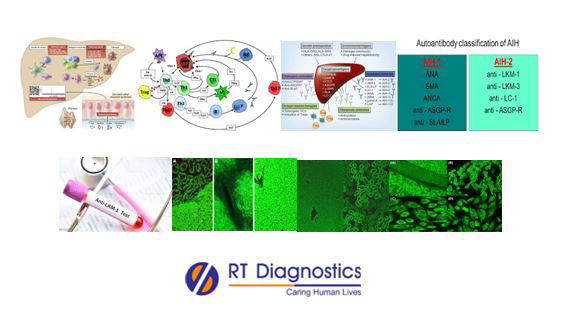LKM-1 Antibodies:
Why LKM-1 Antibodies Test?
CLINICAL INFORMATION
Liver diseases in some cases are also associated with certain autoimmune diseases involving autoantibodies. Thus the detection of such autoantibodies can help in the diagnosis of autoimmune liver diseases such as autoimmune hepatitis, primary biliary cirrhosis or primary sclerosing cholangitis etc. Hepatitis is an inflammation of the liver. It can be caused either due to hepatitis virus, autoantibodies causing autoimmune hepatitis (type 1 and 2) etc. Autoimmune hepatitis (acute or chronic) is a condition where inflammation is caused to the liver. Type-1 autoimmune hepatitis is mostly also associated with other autoimmune diseases such as Type 1 diabetes mellitus and/or ulcerative colitis etc. In type1 autoimmune hepatitis the Liver Kidney Microsometype 1 (anti-LKM-1) antibodies are produced (it is named LK-liver and kidney because these enzymes are detected only in those tissues and there are three types of Anti-LKM antibodies and they are Anti-LKM1 or cytochrome P450 2D6, Anti-LKM2 or cytochrome P450 2C9 and Anti-LKM1 or cytochrome P450 1A2 ), where the immune system targets to attack its own liver enzyme (i.e a self-antigen protein) known as cytochrome 450 2D6 (CYP2D6). While type-2 autoimmune hepatitis is found in adults. Hence patients with type-2 autoimmune hepatitis produce liver-kidney microsomal antibodies. Causes for Type-1 autoimmune hepatitis are viral infections, exposure to toxins or drugs for medication, hereditary disorders, alcohol abuse etc. Symptoms of poor liver function include nausea, vomiting, chronic fatigue, dark urine pale stool, abdominal pain and swelling, edema (swelling of ankle and legs), jaundice etc. Risk factors for autoimmune hepatitis are medications such as minocycline, nitrofurantoin, hydralazine, methyldopa, statins, fenofibrate, infliximab, etanercept, interferon – α and β etc. Some of the clinical manifestations of autoimmune hepatitis are elevated liver enzymes in the bloodstream like ALT, AST etc, jaundice, reduced liver function, presence of autoantibodies LKM1 into-antibodies, anti-Smooth Muscle Antibodies (SMA), Anti-Nuclear-Antibodies (ANA) etc. This LKM-1 auto-antibody test detects and measures the amount (titer) of anti-LKM-1 (or antibodies against CYP2D6) in the bloodstream. Additional tests include the detection of autoimmune antibodies such as Anti-Smooth Muscle Antibodies (SMA), Anti-Nuclear Antibodies (ANA), Autoimmune Thyroiditis, Autoimmune Diabetes mellitus (Type 1 DM etc. Other tests include detection of hepatitis virus (A, B, C etc) to rule out viral hepatitis, screening for jaundice, LFT, liver enzyme markers like AST, ALT, studies on immunohistochemistry, imaging studies etc.

General Instructions:
Sample Requirement: Specimen - Blood sample collected from the vein or urine (as suggested by the physician). Test Preparation: Fasting Required.
NOTE - Sample for specimen collections may vary based on the patient’s condition/cases according to the patient’s presenting complaints/signs or symptoms:
SPECIMEN REQUIREMENT (Special or Rare Cases) - As instructed and guided by Physician / Clinician / Pathologist / as per Laboratory’s requirements, according to procedures and protocols.
This Multi-Specialty Clinical Referral Laboratory RT DIAGNOSTICS provides precise and accurate tests with an extensive range of testing services to the medical centres to help in the diagnosis and identification of pathology in the test specimens for infectious diseases and also to evaluate the function of organ systems of the patient. It prevents further complications and helps to stabilize and restore health to near normalcy at the earliest without delay.



